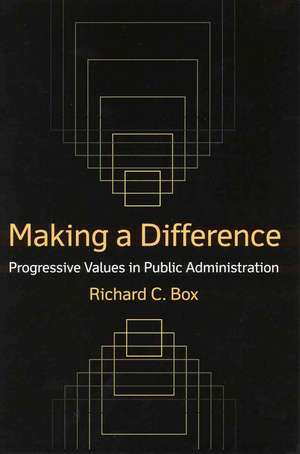Making a Difference: Progressive Values in Public Administration: Progressive Values in Public Administration
Autor Richard C Boxen Limba Engleză Hardback – 15 feb 2009
| Toate formatele și edițiile | Preț | Express |
|---|---|---|
| Paperback (1) | 405.87 lei 6-8 săpt. | |
| Taylor & Francis – 18 noi 2014 | 405.87 lei 6-8 săpt. | |
| Hardback (1) | 1000.27 lei 6-8 săpt. | |
| Taylor & Francis – 15 feb 2009 | 1000.27 lei 6-8 săpt. |
Preț: 1000.27 lei
Preț vechi: 1219.84 lei
-18% Nou
Puncte Express: 1500
Preț estimativ în valută:
191.40€ • 199.45$ • 158.48£
191.40€ • 199.45$ • 158.48£
Carte tipărită la comandă
Livrare economică 03-17 aprilie
Preluare comenzi: 021 569.72.76
Specificații
ISBN-13: 9780765622877
ISBN-10: 0765622874
Pagini: 148
Dimensiuni: 152 x 229 x 16 mm
Greutate: 0.45 kg
Ediția:1
Editura: Taylor & Francis
Colecția Routledge
Locul publicării:Oxford, United Kingdom
ISBN-10: 0765622874
Pagini: 148
Dimensiuni: 152 x 229 x 16 mm
Greutate: 0.45 kg
Ediția:1
Editura: Taylor & Francis
Colecția Routledge
Locul publicării:Oxford, United Kingdom
Cuprins
Chapter 1 The Case for Progressive Values; Chapter 2 Describing the Value Pairs; Chapter 3 Practice and Change; Chapter 4 Normative Teaching and Scholarship; Chapter 5 Toward a Progressive Public Administration;
Descriere
Suitable for those in Public Administration, this book presents regressive and progressive values in five matched pairs, each a continuum of thought and action: aggressiveness and cooperation; belief and knowledge; economics as end, and economics as means; great inequality and limited inequality; and Earth as resource, and Earth as home.
